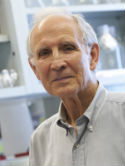| Abstract: |
Gastrointestinal stromal tumor (GIST) is the most common human sarcoma and arises in the gastrointestinal tract. Most GISTs are caused by activating mutations in the KIT receptor tyrosine kinase, such as the exon 11 KIT V559Δ mutation. The small molecule imatinib inhibits KIT and has been a mainstay of therapy in GIST. Unfortunately, imatinib-treated patients typically relapse, most often due to clonal emergence of the resistance-associated KIT V654A mutation. To determine the biologic impact of this second-site mutation in vivo, we created a mouse model with the corresponding V558Δ;V653A Kit double mutation restricted (a) spatially to ETV1+ cells, which include the interstitial cells of Cajal (ICCs) from which GISTs presumably originate, and (b) temporally through tamoxifen treatment after birth. This resulted in the first in vivo model of the most common second-site mutation associated with imatinib resistance in GIST and the first in vivo demonstration that cell-autonomous expression of mutant KIT in the ICC lineage leads to GIST. GISTs driven by the V558Δ;V653A Kit double mutation were resistant to imatinib, while cabozantinib was more effective in overcoming resistance than sunitinib. Compared to control mice with a single V558Δ Kit mutation, mice with a double V558Δ; V653A Kit mutation had increased tumor oncogenesis and associated KIT-dependent STAT activation. Our findings demonstrate that the biologic consequences of a second-site mutation in an oncogenic driver may include not only a mechanism for drug resistance, but changes in tumor oncogenic potential and differential activation of signaling pathways. © 2020, The Author(s), under exclusive licence to Springer Nature Limited. |









